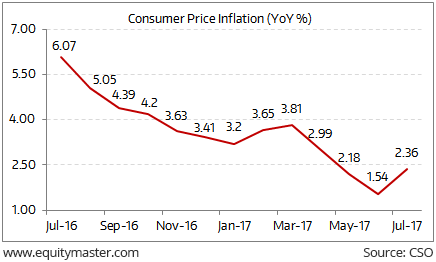- Home
- Todays Market
- Indian Stock Market News August 16, 2017
Sensex Trades on a Volatile Note; FMCG Stocks Witness Buying Wed, 16 Aug 11:30 am
After opening the day in green, Share markets in India witnessed volatile trading activity and are presently trading flat. Sectoral indices are trading on a mixed note with stocks in the FMCG sector and auto sector witnessing maximum buying interest. Banking stocks and capital goods sector are trading in the red.
The BSE Sensex is trading down by 10 points (down 0.1%) and the NSE Nifty is trading down by 5 points (down 0.1%). The BSE Mid Cap index is trading up by 0.3%, while the BSE Small Cap index is trading up by 0.6%. The rupee is trading at 64.24 to the US$.
In news about the economy. According to data released by the Central Statistics Office (CSO), retail inflation as measured by the Consumer Price Index (CPI) rose to 2.36% in July 2017, up from 1.54% in June.
Notably, the rate of inflation in June was the lowest since the Centre began measuring it on a nationwide basis in 2012. CPI was even slower than the 2.19% seen in May, the previous record low.
However, retail inflation is now seen to pick up in July, signaling an uptick in demand and economic activity.
CPI Inflation Rebounds from Record Low

The rise in inflation was mostly on the back of vegetable prices declining at a slower rate in July. The pace of decline in vegetable prices slowed to 3.6% in July from a 16.5% contraction in the previous month. Robust monsoon rains are expected to have a sobering impact on prices but floods in some parts may put some temporary strains on supplies.
Higher prices on account of implementation of the goods and services tax (GST), which came into effect from 1 July, also contributed to the reversal in inflationary trends.
The second volume of the Economic Survey 2016-17 presented on Friday in Parliament took a contrarian view and maintained that India is undergoing a structural shift toward low inflation, mostly due to changing dynamics in the oil market, which has capped upside risks.
The Reserve Bank of India (RBI), which cut its repo rate by 0.25% in its monetary policy review earlier this month, retained its neutral policy stance, citing uncertainty on the future trajectory of inflation because of several uncertainties, flagging possible return of inflationary pressures.
While the government has been eyeing a sharp cut in interest rates, RBI has maintained its cautious stance.
In news from the banking sector.
PSBs have reported 20% jump in the outstanding loans to nearly 9,000 willful defaulters. A willful default occurs when a defaulting borrower doesn't honor an obligation, despite having the capacity to pay, or siphoning off funds and disposing of assets without the knowledge of the bank. The outstanding loans by such willful defaulters rose to Rs 923 billion at the end of financial year 2016-17, as against Rs 766 billion at the end of March 2016, registering a jump of 20.4%.
At the same time, there has been close to 10% increase in number of willful defaulters on annual basis. The number of willful defaulters increased to 8,915 at the end of March as against 8,167 in the previous fiscal, according to data collated by the Finance Ministry.
During 2016-17, 27 public sector banks, including SBI and its five associates wrote off Rs 816 billion crore, the highest in the last five fiscals. The amount was 41% higher than that in the previous fiscal.
Just Released: Multibagger Stocks Guide
(2017 Edition)
In this report, we reveal four proven strategies to picking multibagger stocks.
Well over a million copies of this report have already been claimed over the years.
Go ahead, grab your copy today. It's Free.

Gross NPAs of the public-sector banks rose to Rs 6.4 trillion at the end of March 2017 as against Rs 5 trillion a year ago. In order to check incidences of willful default, Reserve Bank of India has tightened the norms and made it clear that promoter of the defaulting company cannot escape from his responsibility.
India is going through a severe bad loan problem. Major banks have reported poor numbers in the recent earnings season.
The problem of bad loans is indeed quite severe and when we compare it with other global peers it looks daunting.
Out of the ten major economies facing NPA problems, India is ranked seventh.
The overhang of bad debts has not only hit the bank's profitability, but has also restricted their loan book growth.
For information on how to pick stocks that have the potential to deliver big returns, download our special report now!
Read the latest Market Commentary


Equitymaster requests your view! Post a comment on "Sensex Trades on a Volatile Note; FMCG Stocks Witness Buying". Click here!
Comments are moderated by Equitymaster, in accordance with the Terms of Use, and may not appear
on this article until they have been reviewed and deemed appropriate for posting.
In the meantime, you may want to share this article with your friends!